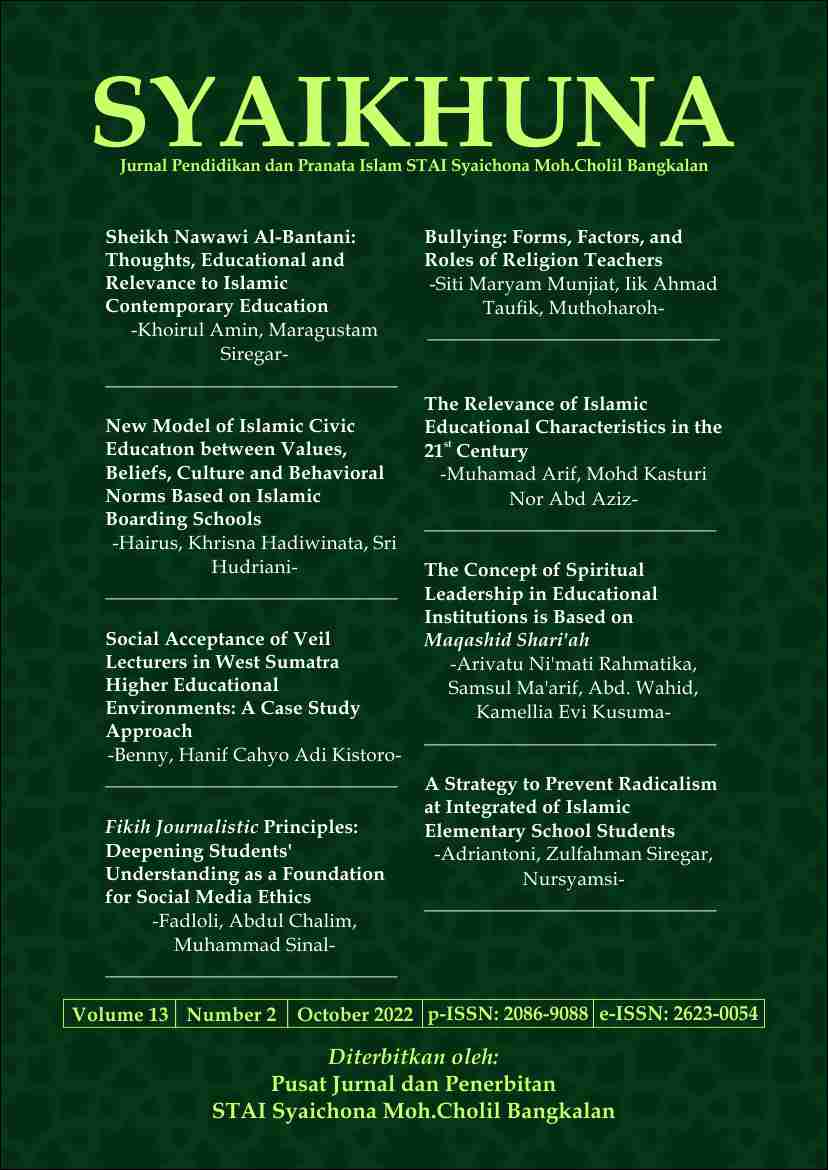A Strategy to Prevent Radicalism at Integrated of Islamic Elementary School Students
(Case study on integrated Islamic elementary school students in the city of Padang)
DOI:
https://doi.org/10.36835/syaikhuna.v13i02.6038Keywords:
Strategy, Prevent, Radicalism, Elementary SchoolAbstract
The purpose of this study was to determine the school's strategy for preventing radicalism in integrated Islamic elementary schools. The type of research used was qualitative with data collection techniques of observation, interviews and documentation, then analyzed the data by reduction. The results of this study indicate, first: The integration of the Integrated Islamic Elementary School learning curriculum in the city of Padang is divided into four types, namely strengthening the curriculum that applies to strengthening character, and strengthening students' personal in order to face global challenges. Second, the strategy in extracurricular activities is carried out in a structured and systematic pattern. The three environmental creation strategies are pursued in an Islamic atmosphere, non-discriminatory, based on genetic characteristics, upholding ethical values, respecting cultural pluralism, and being polite to school members. The four strategies for routine, spontaneous and exemplary activities in an effort to prevent radicalism are carried out by strengthening character, combining learning activities, nurturing and habituation in the form of worship activities, order, neatness and cleanliness, eating and drinking, and social behaviour.References
Abidin, Z. 2009. Integrated Islamic Elementary School as an Alternative School in Surakarta (A Study on Variants of Vision, Mission, and Curriculum Model). Surakarta: Muhammadiyah University of Surakarta.
Alhairi. 2018. Anti-Radicalism Education: Efforts to Cut Radical Movements, BNPT Journal, Strategies to Prevent Radicalism, Terrorism-ISIS.
Bakhtiar, N. 2008. Integrated Islamic Education System (Study of IT Elementary Schools in Pekanbaru City). New Week: LPP UIN Sultan Syarif Kasim Riau.
Hasan, N. 2009. Islamizing Formal Education: Integrated Islamic School and a New Trend in Formal Education Institution in Indonesia. Singapore: S. Rajaratnam School of International Studies.
Hasim, M. (2015). The Potential of Radicalism in Study Schools on Elementary School Islamic Religious Education Books. EDUCATION: Journal of Religious and Religious Education Research, 13(2), 255–268. https://doi.org/10.32729/edukasi.v13i2.242
Izzah, M., et al. 2022. PAI Teacher Strategy in Preventing Radicalism Values in Students. TA'ALLUM: Journal of Islamic Education. 10(1), 56-78.
Maarif Institute. 2018. Strengthening Extracurricular Policies in Suppressing Radicalism in Schools.
Mizani, Z. M. (2021). Character Education of Love for the Homeland in Islamic Elementary Schools Amid the Challenges of Radicalism. Tambusai Journal of Education, 5(3), 9314–9323. https://jptam.org/index.php/jptam/article/view/2470
Muchith, M. S. 2016. Radicalism in the World of Education. Ad-Din Journal; Media Dialectics of Islamic Sciences, 10(1), 163-180. http://dx.doi.org/10.21043/addin.v10i1.1133
Ngaisah, S., & Nurfalah, Y. (2020). The Existence of Multicultural Education in Facing Radicalism. EL Bidayah: Journal of Islamic Elementary Education, 2(1), 27–40. https://doi.org/10.33367/jiee.v2i1.1077
Retnasari & Lisa. 2018. Multicultural Education Strategy as an Effort to Prevent Radicalism in the Era of Globalization. Proceedings of the National Seminar on Education. Surakarta: Muhammadiyah University of Surakarta.
Rokhmad, A. 2012. Islamic Radicalism and Efforts to Deradicalize Radical Understanding. Journal of Religious Social Research. 20(1), 79-113. https://doi.org/10.21580/ws.20.1.185.
Sugiyono. 2013. Quantitative and Qualitative Research Methods. Bandung: Alphabeta.
Sukmadinata, N, S. 2015. Educational Research Methods. Bandung: Rosda Karya.
Yusup, M. 2017. Religious Exclusivism of the Yogyakarta Integrated Islamic School Network (JSIT). Journal of Religion, 13(1). 75-96. https://doi.org/10.14421/rejusta.2017.1301-05.
Downloads
Published
How to Cite
Issue
Section
License
Copyright (c) 2022 Adriantoni Adriantoni, Zulfahman Siregar, Nursyamsi Nursyamsi

This work is licensed under a Creative Commons Attribution 4.0 International License.





